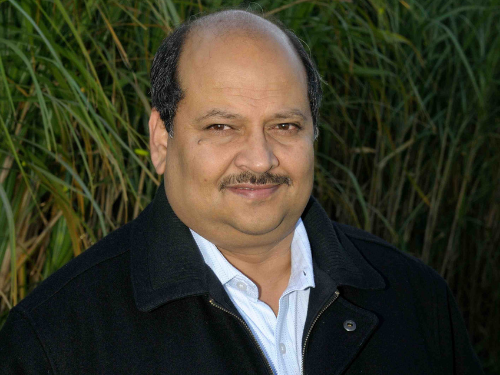Professor Praveen Kumar Named Executive Director of the Prairie Research Institute
Hydrology expert and civil and environmental engineer to lead the institute and its five state surveys
June 1, 2022

Praveen Kumar, the Colonel Harry F. and Frankie M. Lovell Endowed Professor in Civil and Environmental Engineering, has been named the Executive Director of the Prairie Research Institute at the University of Illinois Urbana Champaign. Kumar, an expert in hydrology and a seasoned research leader, will lead the institute starting June 16, pending the approval of the Board of Trustees. Kumar studies the complex interactions between the water cycle, climate change, vegetation, and surface and sub-surface transport of water and chemicals in human-dominated and natural systems. With affiliate appointments in the Department of Atmospheric Sciences; the National Center for Supercomputing Applications; the Carl R. Woese Institute for Genomic Biology; and the Institute for Sustainability, Energy, and Environment, he brings broad interdisciplinary perspectives to the position.
As executive director, Kumar will provide leadership, direction, and overall administration for PRI, promoting excellence in research and ensuring that the Institute fulfills its legislative responsibilities to provide objective and relevant scientific advice to Illinois state government, municipalities, and businesses.
“From safe drinking water to sustainable energy solutions, researchers at the Prairie Research Institute work on the kinds of projects that help communities across the state thrive,” said Susan Martinis, the vice chancellor for research and innovation at Illinois. “Dr. Kumar has an exciting vision for building on PRI’s broad research portfolio, and we are delighted to have such a highly regarded researcher leading the Institute’s next chapter.”
In addition to his scholarly achievements, Kumar has extensive administrative, teaching, and public outreach experience at the national and international level. As director of the NSF-funded Intensively Managed Landscapes Critical Zone Observatory, he led the large-scale, multi-disciplinary, multi-institutional study of the earth’s living “skin,” or critical zone. He was a founding board member of the Consortium of Universities for the Advancement of Hydrologic Sciences, Inc. (CUAHSI), an organization of 130 institutions addressing water-related issues, and he has worked to establish programs in both India and China to tackle water and critical-zone challenges that impact both sustainability and economic growth.
He has mentored over 25 doctoral and 25 master’s students, published 150+ peer reviewed articles, and coauthored three books and 14 book chapters. He has a long track record of campus service, most recently as the Vice-Chair of the Grainger College of Engineering Executive Committee. He is a Fellow of the American Geophysical Union, the American Meteorological Society, and a “Distinguished Alumnus” of the Indian Institute of Technology, Bombay, India, where he completed his B.Tech. degree in civil engineering. He earned his M.S. from Iowa State University and Ph.D. from the University of Minnesota.
“It is a tremendous honor to provide leadership for PRI, which has served the state of Illinois for more than 160 years,” Kumar said. “What attracts me most to the position is the dedication and expertise of the people contributing to its continuing legacy by supporting diverse efforts in the state and nationally, and the rich collection of data as well as physical and biological samples that offer tremendous avenues for lasting impact through science and applications.”
Kumar replaces Mark Ryan in the executive director role. Ryan retired in 2020 after five years at the helm of the institute that provides research, scientific expertise, and objective data that benefit the environment, economy, and people of Illinois and beyond.
Dr. Jeffrey Stein, PRI’s associate director for research, served as interim executive director during a national search for a new leader.
“Dr. Stein was instrumental in maintaining PRI’s momentum, particularly during the difficult early days of the pandemic, and we are so grateful that he stepped up to manage the day-to-day operations of such a vibrant, complex organization as PRI,” Martinis said. “He also laid a strong foundation to more deeply connect students with the institute and diversify the pipeline into applied science careers by working with the Graduate College on PRI’s exciting new undergraduate internship program.”
Established in 2008 at the University of Illinois, the Institute is a research powerhouse, uniting expertise in geology, ecology and biodiversity, archaeology, water, weather and climate, pollution prevention, hazardous waste management, and sustainable energy. Through basic research and applied scientific projects, PRI addresses pressing societal challenges. PRI helps ensure that Illinoisans have sufficient and safe drinking water, aids communities in managing flood risk and planning for other natural hazards, fights the spread of invasive and pest species, monitors ticks and mosquitoes that have the potential to carry diseases, and supports Illinois policymakers, government agencies, communities, and industries in making informed, data-driven decisions.
Over 800 PRI scientists and staff work across Illinois, providing relevant research, long-term data collection, and a capacity for rapid response to emerging issues. PRI holds more than 60 databases and data clearinghouse programs and extensive scientific collections that include millions of rare and irreplaceable fossils, subsurface geological samples, and biological specimens such as insects, fish, and plants. PRI is home to the state’s scientific surveys: Illinois State Archaeological Survey, Illinois State Geological Survey, Illinois Natural History Survey, Illinois State Water Survey, and Illinois Sustainable Technology Center.